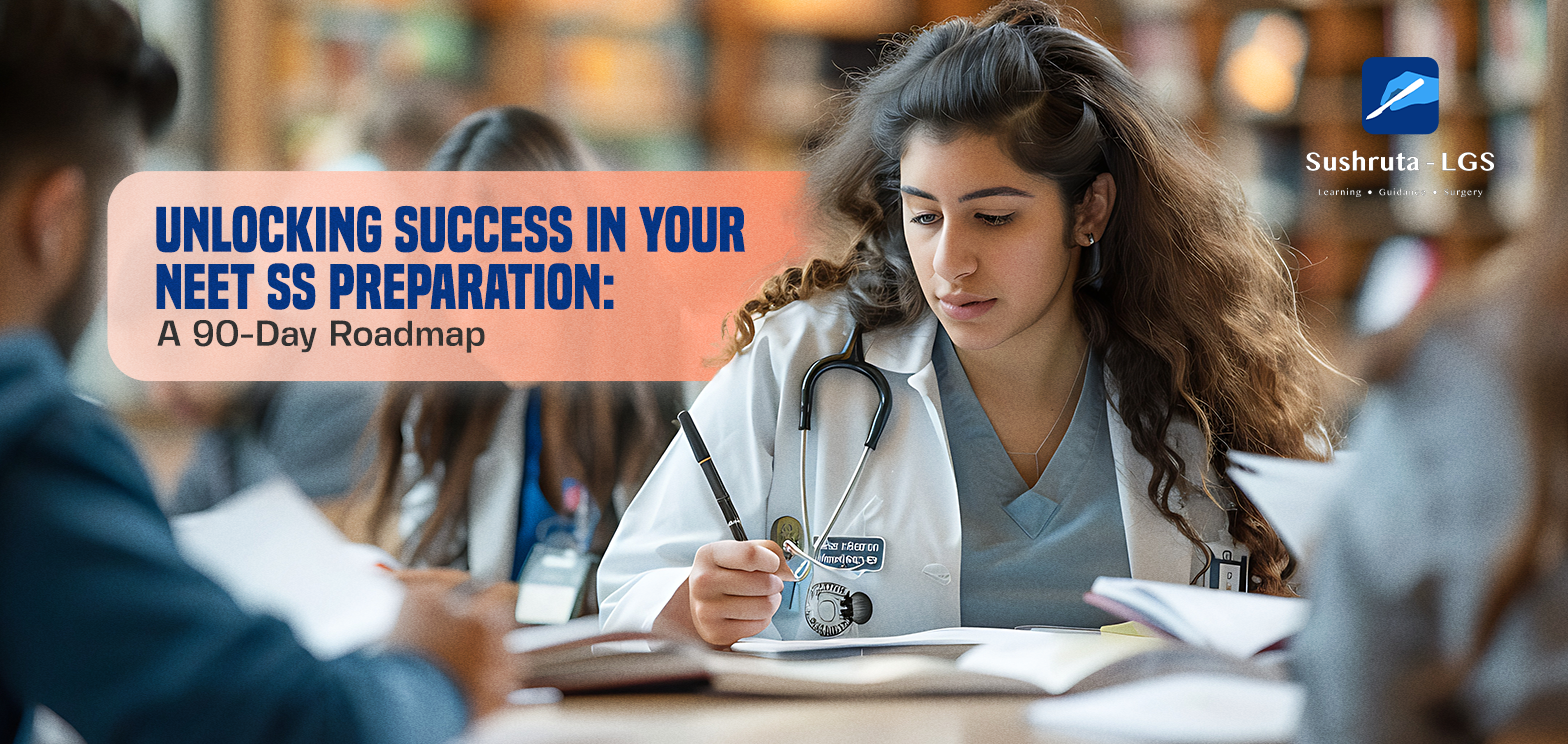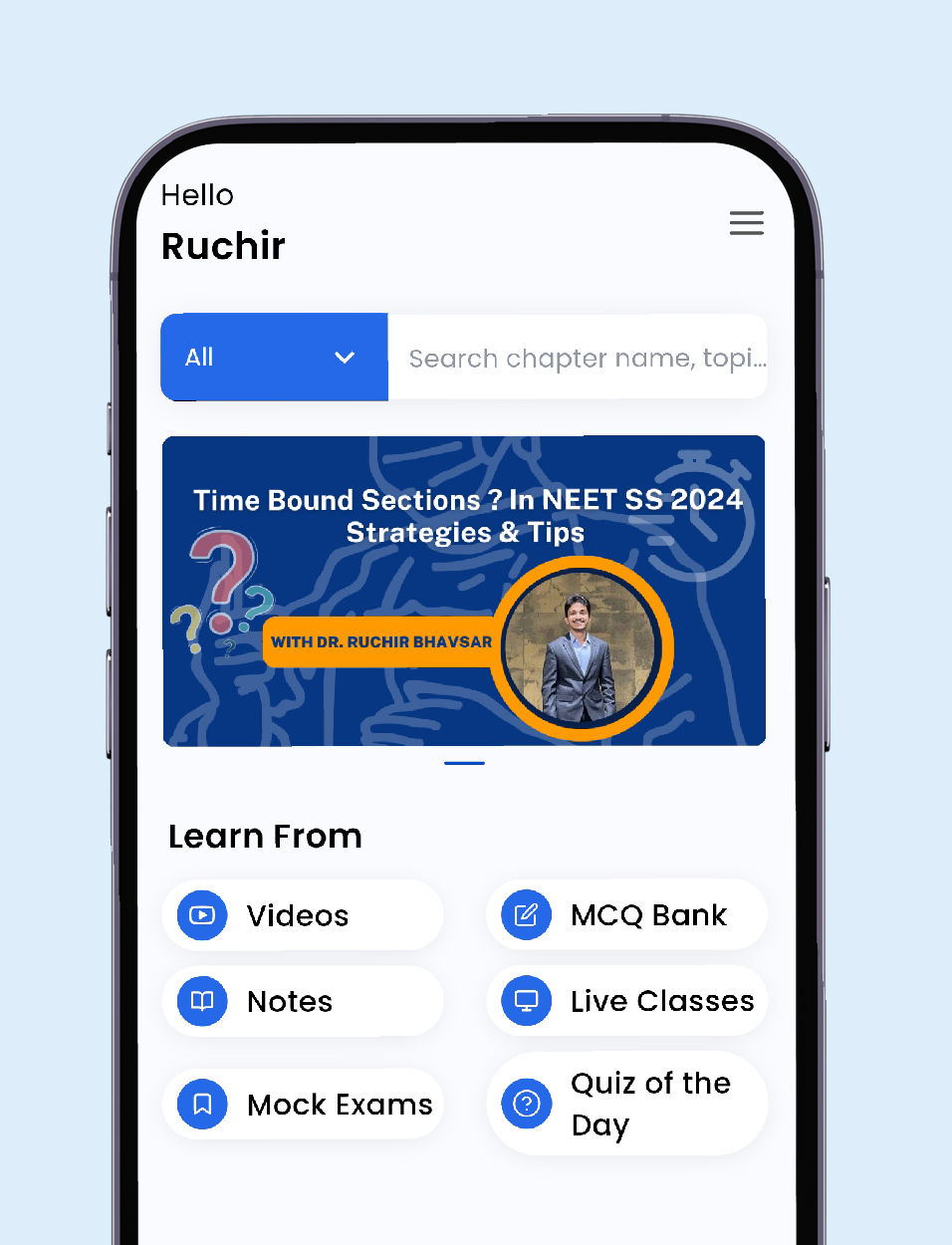By: Dr. Ruchir Bhavsar
Introduction
Preparation for competitive exams like NEET SS can often feel overwhelming. Whether you’re just starting, juggling your studies alongside your MS, or have been preparing for months, having a structured approach can make all the difference. This blog will guide you through actionable strategies and insights to maximize your performance in the next 90 days. These tips are designed to cater to all preparation stages, ensuring clarity and focus as you progress.
The Importance of the Next 90 Days
The next three months are your runway to success. Regardless of when you began your preparation, you are now at a crucial starting point. These 90 days will determine who reaches the finish line. It’s important not to underestimate yourself if you’re just starting and equally crucial not to be overconfident if you’ve been preparing for a while.
Striking the right balance between confidence and discipline is key. The journey ahead is about giving your absolute best, as success is 90% discipline and 10% luck. Discipline transforms hard work into measurable outcomes, setting the stage for consistent progress.
Leveraging Parkinson’s Law in Preparation
A practical approach to preparation is understanding and applying Parkinson’s Law: the effort required to complete a task adjusts to the time available. With only 90 days left, this principle is especially relevant. You can achieve more in limited time by setting firm deadlines and pushing your limits. Tasks like revising MCQs or completing a topic that once took weeks can now be done in days—or even hours—when you focus your energy.
Adopting Space Recall for Better Retention
One of the most effective ways to retain knowledge is through spaced repetition. Here’s a simple strategy:
- Initial Review: Study a topic and complete its MCQs.
- First Recall: Revisit the material or solve MCQs after a week.
- Subsequent Recalls: Space out further revisions over 10 days, a month, and finally in the last three months.
Breaking down your preparation into smaller, consistent chunks enhances retention and prevents burnout. Instead of viewing the entire syllabus as one daunting task, tackle it topic by topic, allocating manageable time slots for each.
The Surgeon’s Mnemonic for Effective Preparation
To streamline your preparation, here’s a mnemonic specifically designed for NEET SS aspirants:
- S: Set your schedule and prioritize achievable daily goals.
- U: Utilize revision notes and previously marked material effectively.
- R: Revise theory and practice MCQs in tandem.
- G: Go through mock exams to evaluate progress and address weaknesses.
- E: Emphasize time management during theory reading, MCQ practice, and mock tests.
- O: Optimize your time effectively.
- N: Never neglect mental and physical health.
The Role of Revision and Mock Exams
Revision is the cornerstone of success. Revising multiple times ensures long-term retention and boosts confidence. For mock exams, remember:
- Use them as tools for self-evaluation.
- Identify strengths, weaknesses, and common mistakes.
- Focus on improving speed and accuracy.
Mock exams aren’t just about scoring well—they’re about understanding where you stand and how to improve.
Structuring Your Schedule
Your preparation plan should be as dynamic as it is disciplined. Here’s a suggested framework:
- Break Down the 90 Days: Divide them into three one-month blocks.
- Segment Each Month: Allocate priorities in 10-day intervals, further dividing them into three-day chunks.
- Daily Targets: Divide your day into morning, afternoon, and evening slots, focusing on theory, revision, and MCQs respectively.
A smaller, goal-oriented approach fosters psychological confidence. Successfully completing daily and weekly targets creates a positive momentum that propels you forward.
Prioritizing Topics for Study
Not all topics are equally weighted. Based on trends from recent years, here’s a suggested prioritization:
- Priority 1: Specialized topics such as neurosurgery, endocrine surgery, and pediatric surgery.
- Priority 2: General surgery and less familiar specialties.
- Priority 3: GIT-related topics, as these are often well-covered during MS preparation.
This sequence ensures that you build confidence while covering the most critical areas.
Efficient Use of Notes and Study Material
Regardless of your preparation stage, notes are a crucial resource for efficient learning and revision. Whether you’re using notes you created, notes from a course, or marked textbook portions, their proper utilization can streamline your preparation process.
- First-Time Readers: If you’re just starting your preparation, begin by reading textbooks and solving MCQs while keeping your notes handy. Use these notes to consolidate key concepts after each session.
- Post-MS Candidates: Utilize the notes you’ve compiled during your MS, or if you’re using structured notes from a resource like ours, keep them as a ready reference while revising or solving MCQs.
- Long-Time Preparers: Focus on marked portions in textbooks, bookmarked MCQs, or highlighted sections in notes to streamline your revision. Prioritize these during your final review phase.
Selective reading during revision is essential. Avoid re-reading every line of the textbook. Instead, focus on key points and topics you’ve marked as important during your initial study sessions.
The Importance of MCQ Practice
MCQ practice is non-negotiable for NEET SS success. It enhances your problem-solving ability, reinforces theoretical knowledge, and familiarizes you with exam patterns.
- For Beginners: Start with 50–100 MCQs daily, adjusting based on your pace and availability. Prioritize understanding the solutions and learning from mistakes.
- Experienced Candidates: Aim for 150 MCQs daily. This can be divided into multiple sessions or tackled in a single focused block of time. Use this as an opportunity to train your brain for exam conditions by solving questions at the same time as the actual exam.
Tip: Combine theory reading with MCQ practice using a spaced repetition model. For example, after reading a topic today, practice its MCQs 5–7 days later. This reinforces your retention and aids in long-term memory consolidation.
Maximizing the Test Mode for MCQs
Leverage the test mode in your MCQ practice for a more realistic exam experience. In test mode, allocate the required time (e.g., 100 minutes for 100 questions), attempt the questions without interruptions, and analyze the solutions afterward. This approach:
- Simulates exam conditions.
- Highlights areas of weakness.
- Familiarizes you with time management under pressure.
Avoid over-relying on practice mode, as it’s best suited for quick reviews during time constraints. For in-depth preparation, test mode offers the necessary rigor to elevate your performance.
Mastering Mock Exams
Mock exams are transformative tools for the final three months of preparation. Here’s how to maximize their impact:
- Take Them Weekly: Consistent practice through weekly mock exams builds stamina and sharpens your focus.
- Analyze Mistakes: Use detailed analyses provided by mock platforms to identify:
- Knowledge gaps.
- Topics needing revision.
- Trends in silly mistakes (e.g., changing correct answers to incorrect ones).
- Improve Gradually: Your mock exam performance should show an upward trajectory. Focus on reducing errors, improving accuracy, and refining time management.
Smart Tip: Don’t just target a rank or specific score—aim for the best. By targeting All India Rank 1, you’ll naturally push yourself to perform at the highest level, securing your desired seat.
The Role of Mental and Physical Health
Your mental and physical health directly influence your ability to concentrate, retain information, and perform under pressure. Incorporate the following into your routine:
- Meditation: Practice for 10–15 minutes twice daily to reduce stress and improve focus.
- Light Exercise: Dedicate 20–30 minutes daily to physical activity, such as walking, stretching, or yoga, to stay energized and stress-free.
This holistic approach ensures you remain motivated and resilient during the most critical phase of your preparation.
Addressing Key Challenges
During the session, common challenges faced by students were discussed, such as time management and the difficulty of solving large numbers of MCQs. Here’s how to overcome them:
- Solve in Blocks: Break your MCQ practice into manageable blocks. For example, allocate three hours in the afternoon for focused practice and review.
- Customize Your Strategy: Understand your pace and work accordingly. If 50–100 MCQs per day is achievable, focus on quality over quantity.
- Job Constraints: If you’re juggling work and studies, prioritize study time for these three months. If possible, take a temporary break from job commitments to focus entirely on preparation.
Building a Robust Study Plan
Divide your preparation time effectively between theory, MCQ practice, and mock exams. Adjust your ratios depending on your progress and starting point:
- Beginners: Allocate 70% to theory and 30% to MCQs in the first two months.
- Experienced Candidates: Opt for a balanced approach, dedicating 50% of your time to each.
Couple this with a spaced repetition strategy, revising topics at intervals to reinforce learning. Utilize resources like MCQ banks divided by textbook or topic to practice systematically and efficiently.
Schwartz and Resource Optimization
For candidates in the last three months of preparation, tackling Schwartz from scratch is not advisable. Instead:
- For Beginners: Focus on material already covered in mock exams or your existing notes.
- For Long-Time Preparers: Utilize Schwartz-specific content from your notes or question banks to cover additional insights without unnecessary effort.
While Schwartz contributes about 10–15% of the syllabus, it primarily adds minor details to already-covered topics. Prioritize high-yield material and revision to maximize your preparation efficiency.
Resolving Conflicting Information Between Textbooks
Occasionally, discrepancies may arise between textbooks like Bailey and Sabiston. In such cases:
- Follow Bailey for NEET SS-specific questions, especially for statistical data or percentages, as it aligns closely with exam patterns.
- Use Sabiston selectively for niche topics like pressure sores, where it may provide more accurate details.
This focused approach minimizes confusion and ensures alignment with the exam’s expectations.
Biostatistics and Dry Topics
Biostatistics often lacks a dedicated, single-source reference. For NEET SS preparation:
- Use amalgamated notes and MCQ banks to cover essential concepts effectively.
- Apply spaced recall for dry topics. Revisit these areas periodically to enhance retention, integrating flowcharts, tables, or concise notes into your daily schedule.
MCQ Practice: Last 15 Days
In the final 15 days leading up to the exam:
- Focus on Revision: Shift your attention entirely to reviewing previously solved MCQs and notes.
- Topic-Based Practice: Filter MCQs by topic during earlier mock exam reviews to reinforce weaker areas.
- Avoid Overloading: Stick to high-priority topics and ensure a steady pace without cramming.
Avoiding Low-Yield Areas
Certain topics are rarely covered in NEET SS and can be deprioritized to save time. Examples include:
- Orthopedics: Avoid unless it overlaps with general surgery principles.
- Skin and Subcutaneous Tissue: Focus on malignancies rather than benign conditions.
- Head and Neck: Concentrate on salivary glands and neck dissection techniques.
Key Strategies for Retention
Retention is critical for competitive exams, especially for vast syllabi like NEET SS. To improve retention:
- Implement Spaced Recall: Revisit topics at set intervals, such as 10 days, one month, and two months after initial study.
- Use visual aids like flowcharts, diagrams, or concise notes. Place these in visible locations (e.g., a study board) for regular reinforcement.
Precision Pointers: Must-Read Topics
Refer to the “Precision Pointers” blog for a comprehensive list of must-read topics. These pointers include theory portions, flowcharts, and tables critical for NEET SS. While the list is not exhaustive, it highlights non-negotiable topics you must cover to maximize your chances of success.
The Right Mindset for NEET SS
Adopt a winning mindset focused on excellence:
- Strive to achieve All India Rank 1, even if your ultimate goal is to secure a seat. This ambitious approach motivates consistent effort and thorough preparation.
- Avoid mediocrity by aiming to cover all essential material, leaving no gaps in your preparation.
Conclusion and Final Encouragement
Preparation for NEET SS is a challenging journey, but with the right strategy, discipline, and mindset, success is within reach. Focus on high-yield areas, maintain consistency, and leverage your resources effectively. Remember to take care of your mental and physical health to stay motivated and perform at your best.
If you have additional queries, feel free to reach out through WhatsApp or your study groups. Wishing you all the very best in your preparation—may you achieve your desired rank and secure your dream seat. Good luck!







